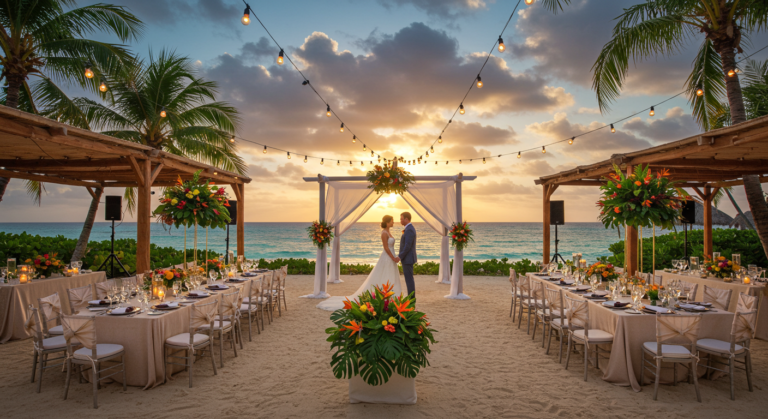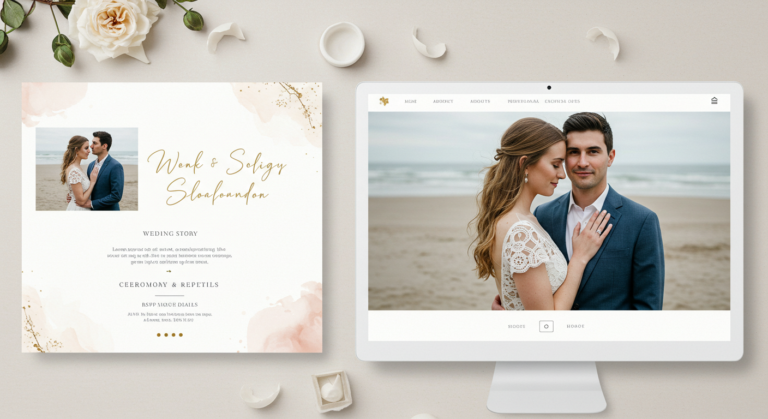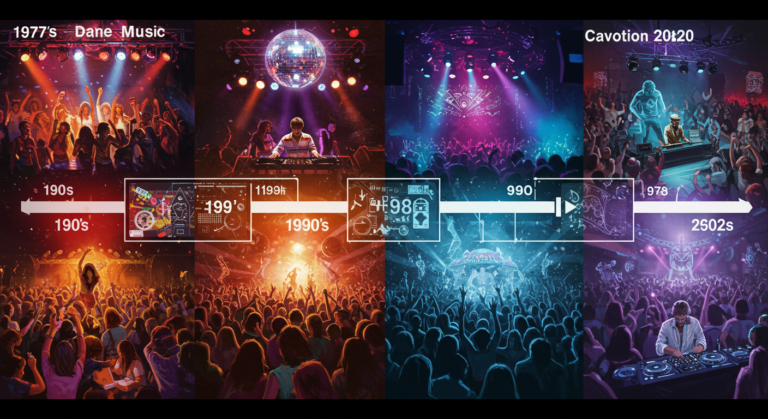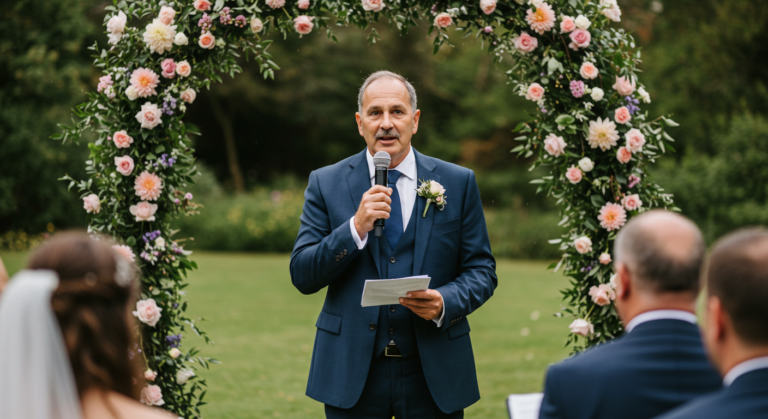The Essential Guide to Designing a Wedding Website

Introduction to Wedding Websites
A wedding website serves as a centralized digital platform that provides essential information about a couple’s upcoming nuptials. With the growing reliance on technology and the internet to share pivotal life events, wedding websites have become an indispensable tool for modern couples. These dedicated sites allow couples to convey significant details to their guests, facilitating smoother communication throughout the wedding planning process.
One of the primary advantages of having a wedding website is its ability to streamline information dissemination. Couples can share important details such as the wedding date, venue, dress code, and accommodation options in one easily accessible location. This not only reduces the need for time-consuming phone calls and emails but also minimizes the chances of crucial information getting lost or miscommunicated. Additionally, many couples opt to include fun stories, photos, and personal messages that help their guests feel more connected to the celebration.
Another significant benefit of a wedding website is the simplified RSVP management. Couples can set up online RSVP forms that allow guests to confirm their attendance with just a few clicks. This feature not only saves time but also helps couples better estimate their guest count for catering and seating arrangements. The integration of RSVP management systems often accommodates special dietary requests and allows guests to select their meal choices, further enhancing the guest experience.
Moreover, a wedding website serves to keep guests informed about any logistical updates, such as changes in the ceremony location, travel advisories, or weather-related announcements. By having an online platform, couples can effortlessly update their guests in real-time, ensuring that everyone remains informed. Ultimately, a wedding website enriches the overall wedding experience by providing a seamless flow of information, thereby reflecting the couple’s style and personality.
Choosing the Right Platform
When it comes to designing a wedding website, selecting the right platform is paramount for ensuring a seamless and enjoyable experience for couples and their guests. Several options are available, each with its unique features, advantages, and limitations. The couple’s specific needs, technical expertise, and personal preferences will play a significant role in determining the most suitable platform.
Dedicated wedding website builders like The Knot and WeddingWire are specifically designed for couples planning their nuptials. These platforms generally offer user-friendly interfaces, allowing users to create beautiful websites without requiring extensive technical knowledge. Many dedicated platforms come equipped with a range of pre-designed templates, RSVP management tools, and features tailored for wedding events. However, while these platforms are easy to navigate, they might have limitations in terms of customization and may come at a higher price point than some general website builders.
On the other hand, general website builders, such as Wix and Squarespace, provide a versatile approach to wedding website development. Offering a broad array of templates and design elements, these platforms enable couples to build a more personalized website. They also usually include features such as e-commerce capabilities and extensive customization options. The downside is that the learning curve may be slightly steeper than that of dedicated builders, and users may need to invest additional time to optimize their site.
Moreover, some wedding planning services include website creation as part of their offerings. This can be a convenient choice for couples who prefer a more holistic approach to their wedding planning. It is essential for couples to weigh factors such as ease of use, pricing, and functionality when comparing platforms. Ultimately, the best option will align with their vision for their wedding website and their comfort level with technology.
Key Features to Include
When designing a wedding website, it is crucial to incorporate key features that enhance user experience and provide essential information for guests. Firstly, a comprehensive schedule of events is fundamental. This section should clearly list the timeline of the wedding day, including the ceremony, reception, and any pre-wedding events such as showers or rehearsal dinners. Providing clear timings and locations ensures that guests are well-informed and can plan accordingly.
Another essential feature is RSVP functionality. An integrated RSVP system allows guests to confirm their attendance with ease, helping the couple to keep track of expected numbers. This can be further enhanced with options for meal preferences, and any dietary restrictions, enabling the couple to plan the catering effectively.
Including travel and accommodation information is also vital, especially for guests traveling from out of town. This section should provide details about nearby hotels, transportation options, and perhaps even local attractions for those who wish to explore the area. Facilitating easy access to this information can significantly reduce the stress often associated with wedding planning for both the couple and their guests.
A visually appealing gallery for sharing photos can serve as a delightful feature. This section allows the couple to share engagement photos, pre-wedding events, and ultimately, images from the wedding day itself. It creates an avenue for friends and family to relive precious moments and showcases the couple’s journey beautifully.
Lastly, an ‘Our Story’ section offers a personal touch, allowing couples to narrate their journey together. This sharing of their love story fosters a sense of connection with their guests and enriches the overall experience. In crafting the wedding website, focus remains on user experience and accessibility, ensuring guests can navigate the site easily and find the information they need without difficulty.
Designing Your Wedding Website
When it comes to designing your wedding website, the first step is selecting a theme that encapsulates the essence of your special day. The chosen theme should resonate with the wedding’s aesthetic, whether it’s rustic, elegant, modern, or vintage. Utilizing platforms that offer customizable templates can significantly aid in this endeavor, ensuring your website aligns seamlessly with your vision.
Next, consider the color scheme of the website. Selecting a palette that reflects your wedding colors is crucial for creating a cohesive look. This not only enhances the visual appeal but also helps convey a sense of harmony throughout the site. Pairing complementary colors can accentuate important elements such as headings and call-to-action buttons, while more subdued tones can provide a backdrop that allows images to stand out.
Typography also plays a pivotal role in design. Use a maximum of two to three fonts to maintain consistency and readability. A decorative font for headings can express your style, while a simple, clean font for body text ensures legibility. Ensure that the text contrasts well with the background, making it easy for visitors to navigate through the information you provide.
Imagery is another essential component. High-quality images that reflect your relationship, engagement, and wedding theme engage visitors and contribute to the overall design. They should work in harmony with the text and colors used on the site. Additionally, including images of key locations or details of the ceremony can instill excitement and joy in your guests.
As you integrate these elements, aim for a layout that promotes easy navigation for users. An intuitive structure ensures that guests can access information about the event effortlessly. By focusing on these design aspects, your wedding website will not only look stunning but also function effectively, creating an enjoyable experience for visitors as they journey through your wedding plans.
Creating Compelling Content
When designing a wedding website, creating compelling content is essential to capture the essence of the couple’s love story and communicate important information with their guests. One of the fundamental elements of engaging content is personal narratives. Couples should consider sharing their journey together, detailing how they met, memorable experiences, and the proposal story. This personal touch not only invites guests into their lives but also establishes a connection that resonates with those who will be attending the wedding.
Additionally, introducing members of the wedding party is a vital aspect of the content. Couples can include brief biographies and photographs of their bridesmaids, groomsmen, and other significant participants. This not only honors those individuals but also helps guests become acquainted with them before the big day. Sharing interesting anecdotes or fun facts about these key figures can further enrich the content, allowing guests to feel more engaged and connected to the event.
Messages to guests should also be thoughtfully crafted. Couples might want to include a warm welcome note that expresses their excitement about celebrating this special day together. This note can also provide details like dress code, accommodations, and travel tips to ensure guests are well-informed and feel appreciated. By using heartfelt language, couples can convey their gratitude and importance of having their loved ones present.
Through storytelling and the sharing of genuine feelings, couples can create an inviting atmosphere on their wedding website. Engaging content invites guests to participate in the festivities and fosters a sense of involvement, which is crucial in making the wedding experience even more memorable. By thoughtfully curating content, couples can set the tone for their celebration, making it a beautiful and inclusive event for all.
Wedding Website Etiquette
Creating a wedding website can be a delightful yet challenging task, especially when it comes to etiquette. It’s essential to strike a balance between providing necessary information and maintaining sensitivity toward your guests’ feelings and expectations. One of the crucial aspects of wedding website etiquette involves privacy considerations. Couples should thoughtfully assess the information shared on their site, including their love story, personal details, and specific venue locations. Including a password-protected section can help restrict access to sensitive content and maintain guests’ privacy.
When wording invitations and RSVP messages, clarity and politeness should be prioritized. Be explicit about the date, time, and location, making it easy for guests to understand. A gentle reminder about RSVP deadlines helps ensure you receive timely responses, which is vital for planning logistics. Furthermore, phrases such as “We kindly request your presence” or “Please let us know if you can join us” can foster a welcoming tone while encouraging guests to respond.
Managing guest interactions is another key element of wedding website etiquette. Couples should carefully consider how to engage with their invitees, especially concerning sensitive topics like gift preferences, children at the wedding, or dietary restrictions. Instead of stating “No children allowed,” it may be more tactful to say, “We respectfully ask that this be an adults-only celebration.” Providing a separate FAQ page can address common questions and assist in navigating delicate issues without directly confronting guests.
Through mindful communication and attention to detail, couples can cultivate a positive experience for everyone involved in their wedding journey. By adhering to these etiquettes, a wedding website can serve as an effective tool for information sharing while ensuring that all guests feel appreciated and respected.
Strategies for Effectively Promoting Your Wedding Website
Once you have created a wedding website that encapsulates all essential details about your special day, the next step is promoting it effectively to your guests. One of the most straightforward methods is to include the website URL on save-the-date cards. By doing so, you not only inform your guests about the date but also direct them to a centralized platform for all the information related to the wedding.
Additionally, incorporating the website link in the formal invitations is critical. This not only serves as a reminder for your guests but also encourages them to visit the site for updates, such as changes in the schedule, venue, or any special instructions regarding accommodations. Attaching the URL on a dedicated card, or even printing it directly on the invitation, can facilitate easy access, ensuring that your guests are always informed.
Using social media to promote your wedding website can also be highly effective. Consider creating an event on platforms like Facebook or Instagram, where you can share the link with your friends and family. Utilize posts and stories to highlight important updates regarding the wedding and remind guests to visit the website for the latest information. This not only raises awareness but also engages your social circle, prompting them to interact with your wedding preparations.
Encouraging guests to use the website for RSVPs is another crucial aspect. By emphasizing the convenience of online responses, you can streamline the process of managing attendee numbers. Providing clear instructions on how to RSVP through the website will reinforce its importance in maintaining efficient communication. Consistently reference the website in conversations and guest interactions, highlighting it as the go-to resource for all wedding-related matters.
Maintaining Your Website Post-Wedding
Once the wedding day has passed, couples often wonder what to do with their wedding website. While its primary purpose was to inform guests and facilitate planning before the big day, a wedding website can serve various beneficial functions afterwards. One of the most delightful uses is to create a digital space for sharing wedding photos. A dedicated section can be established where couples upload their professional photographs as well as candid shots provided by guests, allowing all who attended to relive the joyous moments.
Another meaningful aspect is to use the website for writing thank-you notes. Couples can create a page where they acknowledge the generosity and thoughtfulness of their guests, expressing their gratitude in a public forum. This not only makes it easier for couples to remember who to thank but also allows visitors to feel appreciated and recognized for their contributions to the celebration.
Furthermore, couples can maintain their wedding website as a lasting memorial of their special day. By keeping the domain active, they create a digital keepsake that can be cherished for years to come. This can include sections like a wedding details page, stories about their proposal, or individual reflections about the ceremony and celebration. Beyond serving as a memento, the website can be an effective platform for couples to document their journey together, hosting updates on anniversaries or milestones.
Additionally, couples might consider repurposing their wedding website for future family events. Whether it’s birthdays, holidays, or family reunions, the established domain can be a central hub for sharing important updates and invitations. As time passes, the wedding website can evolve, showcasing the couple’s evolving story, thus making it a cherished and practical tool long after the wedding has concluded.
Conclusion: Celebrating Your Love Online
In the rapidly evolving landscape of wedding planning, a wedding website has emerged as a vital component for couples looking to streamline their preparations and connect with their guests. This digital platform serves as a central hub for sharing essential details such as the wedding date, venue, and itinerary, while also providing a space for personal stories, photos, and updates. By embracing this modern tool, couples not only enhance their organization but also foster a deeper engagement with their loved ones.
The creative process of designing a wedding website allows couples to express their unique vision and personality. From choosing layouts that reflect their style to incorporating multimedia elements that illustrate their journey together, this online presence becomes a vibrant extension of their love story. Furthermore, it offers opportunities for interactivity. Features such as RSVP forms, guest books, and even integrated social media feeds can create a more immersive experience for friends and family. This engagement contributes to an enriched atmosphere leading up to the big day.
Moreover, a wedding website serves as a resource for guests who may have questions or need assistance planning their trip. By providing information on accommodations, local attractions, and transportation options, couples can ensure that their guests feel welcomed and informed. This consideration enhances the overall wedding experience, fostering not only excitement but also a sense of community among attendees.
As couples navigate the joys and challenges of wedding planning, establishing a dedicated online space can significantly aid in reducing stress and increasing enjoyment. The integration of technology into this celebratory journey ultimately highlights that love knows no bounds, reaffirming the idea that sharing joy and connection can be beautifully achieved in both the physical and digital realms. Now, more than ever, love can truly be celebrated online.








